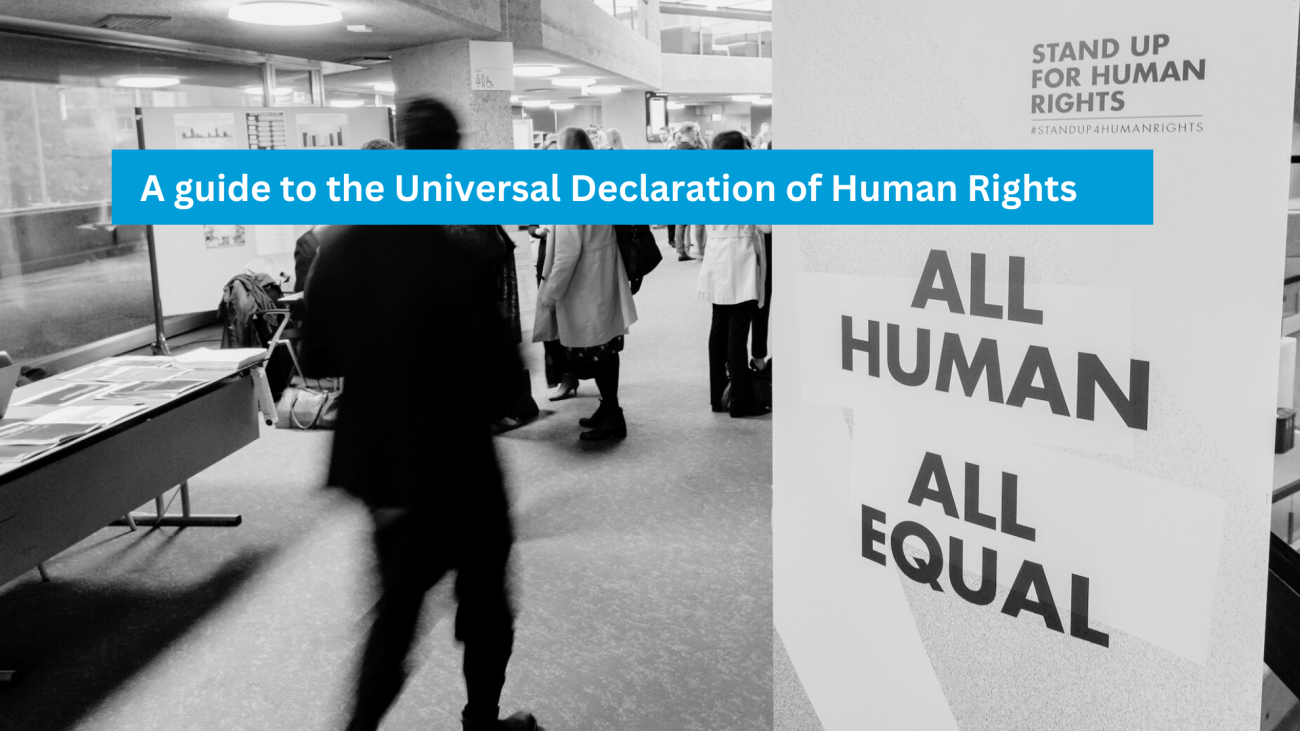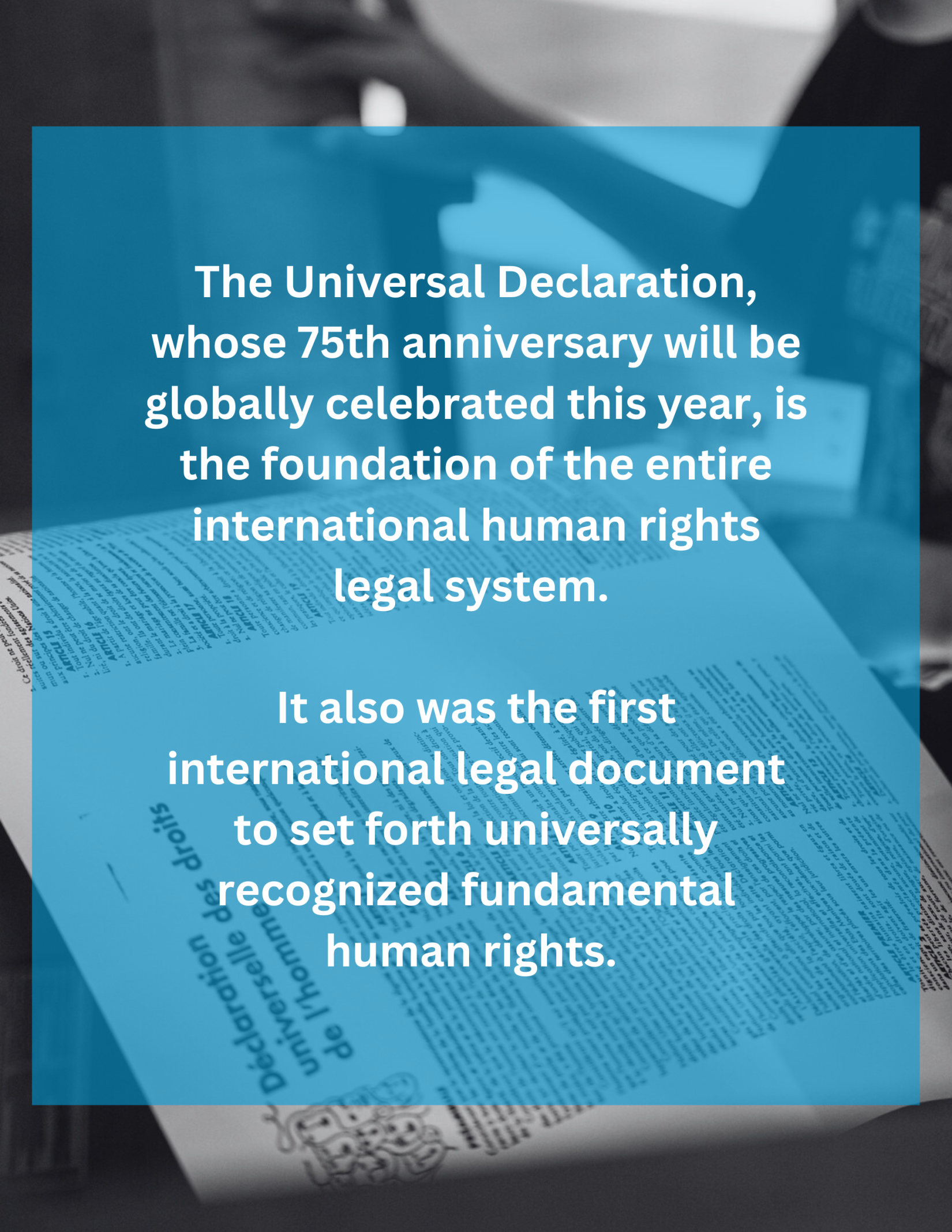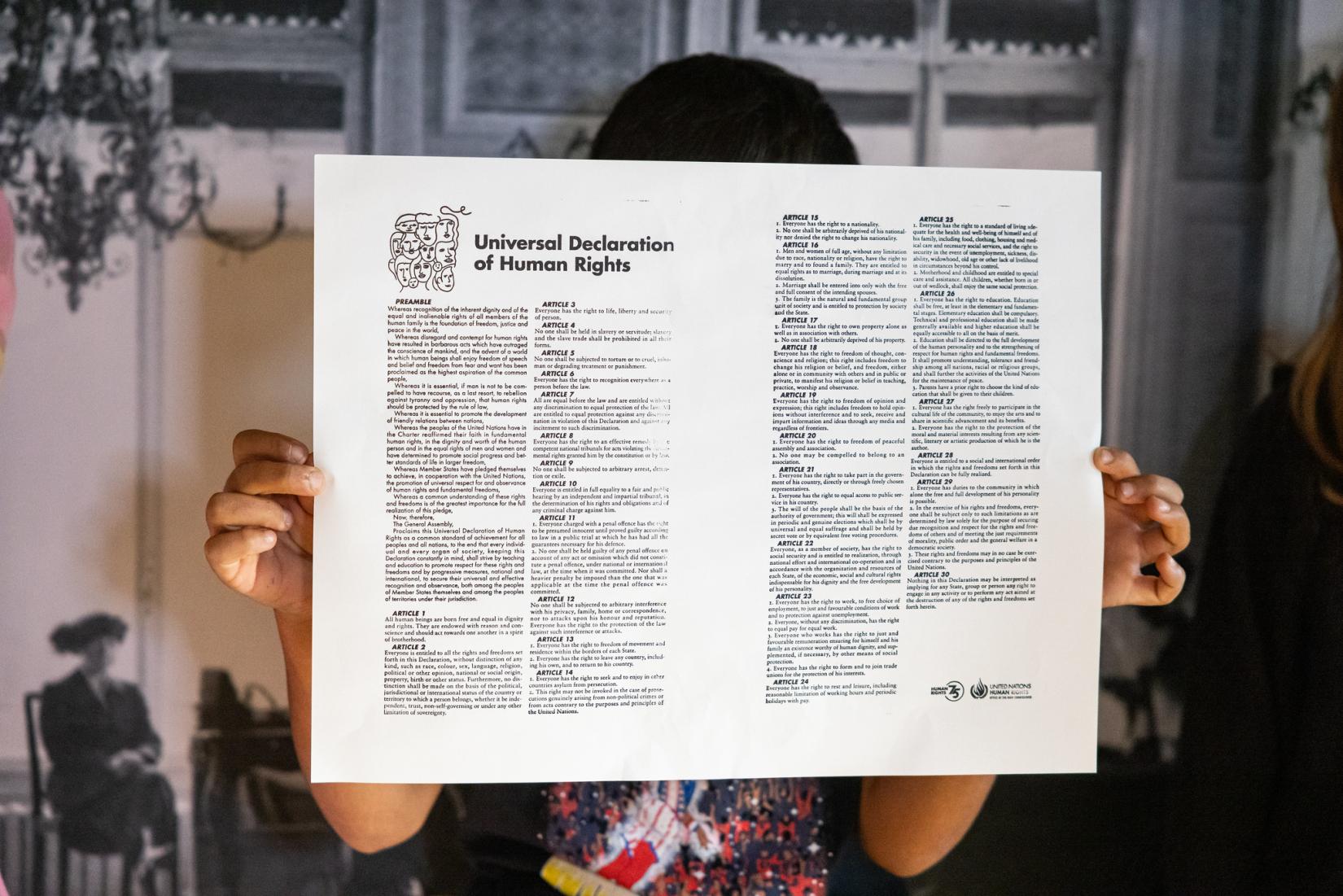Explainer: a guide to the Universal Declaration of Human Rights

Human rights is a concept founded on the principle that all people are born equal in dignity and rights.
What are human rights?
Human rights is a concept founded on the principle that all people are born equal in dignity and rights. These rights are inherent to us all, regardless of nationality, sex, national or ethnic origin, color, religion, language, or any other status. They range from the most fundamental - the right to life - to those that make life worth living, such as the rights to food, education, work, health, and liberty.
Human rights have four fundamental characteristics:
- Universality - Everyone is equally entitled to the enjoyment and fulfillment of their rights.
- Inalienability - Rights cannot be taken unless under specific circumstances in full respect of due process.
- Indivisibility - All dimensions of rights are interlinked to one another.
- Interdependency – Rights can be fulfilled if all rights are protected and promoted.
Although some of these rights can be limited under specific circumstances when prescribed by the law, several, including the right to freedom from torture, right to freedom from slavery, and right of opinion among others, cannot suffer limitation of any sort for any reason. These are referred to as non-derogable rights.
What is the Universal Declaration of Human Rights?
Following the horrors of World War II, the member states that formed the United Nations explicitly recognized that the denial and violation of human rights was almost always a critical factor driving or causing armed conflict. In view of creating an international order based on peace and stability, and an organization to prevent any future descent into violence and chaos, the General Assembly in 1946 mandated the Commission on Human Rights, comprised of eminent experts from all over the world, to produce a draft declaration. As a result, the United Nations General Assembly adopted the Universal Declaration of Human Rights (UDHR) through Resolution 217 A (III) on 10 December 1948.
The Universal Declaration, whose 75th anniversary will be globally celebrated this year, is the foundation of the entire international human rights legal system. It also was the first international legal document to set forth universally recognized fundamental human rights. Over 50 countries eventually contributed to the drafting with Myanmar being among the first states to vote in favor of its adoption, accepting the principles and rights enshrined in the UDHR just months after declaring independence.
As a Declaration, the UDHR is not legally binding per se, but it has wielded significant impact on the global human rights landscape, influencing the development of international standards, the human rights treaty-based legal framework, and national legislation throughout the world. Its principles, because they are recognized and accepted by all Nations, have assumed force of customary law creating legal obligations for States to protect, promote, and fulfill the rights enshrined in the Declaration. Together with the International Covenant on Civil and Political Rights and the International Covenant on Economic, Social and Cultural Rights, one of the four treaties Myanmar has ratified, the UDHR forms the International Bill of Rights. It is notable, as well, that the human rights enshrined in the Declaration also served as the impetus behind the creation of several UN agencies, funds and programmes and the definition of their mandates.
Confirming its universal value, the UDHR has been translated in over 500 languages and it is also available in Myanmar language.

How the UDHR protects your rights.
As the foundational document for the universal rights system, through its 30 articles the UDHR encompasses the entire spectrum of human rights covering the civil, political, economic, social, and cultural dimensions of our daily lives.
Pivotal to this system are the concepts of equality and non-discrimination. Recognizing how World War had brought unimaginable sufferings through dehumanization, the UDHR unequivocally states that all people are equal and no discrimination on race, colour, sex, language, religion, political or other opinion, national or social origin, property, birth or other status, is allowed. It also prohibits any incitement to any discrimination on any ground.
These concepts are strictly correlated to a key set of rights that the UDHR recognizes as belonging to all: the rights to life, liberty, and security. Recalling the interdependence of rights, the UDHR sets forth that life, liberty, and security are interlinked with equality and non-discrimination. This epitomizes in the first fundamental freedom protected in the UDHR: freedom from slavery.
Then, the UDHR introduces the core concepts of civil and political rights. It recognizes the right of everyone to be treated equally before the law, including the right to be presumed innocent and not to be tried for acts that did not constitute a crime at the moment of commission, and it prohibits subjecting anyone to torture or to cruel, inhuman or degrading treatment, and to arbitrary arrest, detention, or exile. In case of violations, the UDHR establishes the right of everyone to be heard before an independent and impartial tribunal in fair and public hearings, and the right to remedy for the violations suffered.
In the subsequent articles and transitioning toward the economic, social, and cultural dimension of our rights, the UDHR protects the right to a nationality and not to be deprived of it, freedom of movement, the right to privacy, family, and home, the right to marry and create a family, the right to own properties, as well as the right to seek and enjoy asylum from persecution, especially for refugees, which is the crimes stemming from the violation of multiple fundamental rights. This latter principle – in article 14 -- formed the initial basis for the Refugee Convention of 1951.
To realize all the rights above, the UDHR recognizes that everyone has the right to freedom of thought, conscience, religion, opinion, and expression. To realize them, all people are also entitled to peacefully assembly and associate to advance these rights, as well as the right to effective participation in the public life of the State.
These rights are interconnected with the right to social security, the right to a standard of living adequate for health and wellbeing, including food, clothing, housing, and medical care, right to education, and participation in cultural life. This is also strictly combined with the right of everyone to work, freely choosing their career, and work under just and favourable conditions, including the right to rest and reasonable working hours.
In its final part, the UDHR covers the so-called “collective and general rights”. This entails defining the fundamental methods of exercising these rights, delineating the spheres where individual rights may not be invoked, outlining the individual's obligations to society, and prohibiting the utilization of rights in a manner that contradicts the objectives of the United Nations. To make sure that everyone's rights are respected, it is necessary to have an order that can protect them. The purpose of collective and general rights is that this order should be global.

UDHR and the human rights situation in Myanmar.
Following the military attempt to seize power in Myanmar in February 2021, the UN Office of the High Commissioner for Human Rights has repeatedly indicated that regressions have occurred in the enjoyment and/or protection of every single right enshrined in the Universal Declaration.
Violence directed against the civilian population has systematically violated people’s rights to life, liberty, security, freedom from arbitrary arrest, equality before the law, expression, movement, as well as the fundamental freedoms of association, assembly, and non-discrimination.
Following the complete collapse of the rule of law as the judiciary has been integrated within military structures losing any element of independence, people suffer from severe violations on the rights to recognition before the law, protection from arbitrary arrest, presumption of innocence, and prohibition of torture among others.
Discrimination is also engrained in the military and legal systems with violations affecting minority communities in particular. Through a combination of instrumentalization of the legal and bureaucratic systems, members of the Rohingya and other minority communities have been stripped of nationality and the rights connected to it, including the ability to participate in the public life of the country, accessing life-saving services such as health and education, as well as other fundamental rights such as the right to freedom of movement, work, marriage, and living in adequate conditions.
UDHR 75 and our obligation to continue promoting human rights.
Over the years, the UDHR has had a significant impact on the advancement of human rights worldwide. Some of the successes in promoting human rights globally include:
- The development of a comprehensive international human rights framework;
- The incorporation of UDHR principles into national constitutions, legislations, and policymaking;
- An enhanced global protection of rights and freedoms;
- Increased global awareness;
However, there are still numerous challenges in ensuring the full realization of human rights and it is necessary to continue to work to ensure that everyone everywhere on the planet has the ability to enjoy them all without any form of discrimination.
It becomes therefore our obligation to make sure that each right is protected, promoted, and fulfilled in all dimensions of life, including civil, political, social, economic, and cultural rights. In a collaborative effort to achieve this end, the United Nations, international organizations, and civil societies are working in various regions and sectors.


